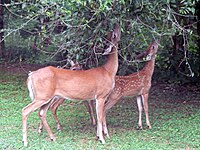
Photo from wikipedia
Simple Summary Solitary bees are important pollinators in managed and wild ecosystems. Across the bee phylogeny, bees may forage on a single species of plant, few plant species, or a… Click to show full abstract
Simple Summary Solitary bees are important pollinators in managed and wild ecosystems. Across the bee phylogeny, bees may forage on a single species of plant, few plant species, or a broad diversity of plants. During foraging, these bees are often exposed to microbes, and in turn, may inoculate the brood cell and pollen provision of their offspring with these microbes. It is becoming evident that pollen-associated microbes are important to bee health, but it is not known how diet breadth impacts bees’ exposure to microbes. In this study, we collected pollen provisions from the bees Osmia lignaria and Osmia ribifloris at four different sites, then characterized the bacterial populations within the pollen provisions with 16S rRNA gene sequencing. We found that diet breadth did not have large effects on the bacteria found in the pollen provisions. We also note that the bacterial communities were slightly different between bee species and site, and there was minimal overlap in the unique bacterial variants between sites and bee species too. Our research supports the hypothesis of environmental transmission for solitary bee microbes, and we suggest future studies investigate the impacts of microbes on larval health. Abstract Mounting evidence suggests that microbes found in the pollen provisions of wild and solitary bees are important drivers of larval development. As these microbes are also known to be transmitted via the environment, most likely from flowers, the diet breadth of a bee may affect the diversity and identity of the microbes that occur in its pollen provisions. Here, we tested the hypothesis that, due to the importance of floral transmission of microbes, diet breadth affects pollen provision microbial community composition. We collected pollen provisions at four sites from the polylectic bee Osmia lignaria and the oligolectic bee Osmia ribifloris. We used high-throughput sequencing of the bacterial 16S rRNA gene to characterize the bacteria found in these provisions. We found minimal overlap in the specific bacterial variants in pollen provisions across the host species, even when the bees were constrained to foraging from the same flowers in cages at one site. Similarly, there was minimal overlap in the specific bacterial variants across sites, even within the same host species. Together, these findings highlight the importance of environmental transmission and host specific sorting influenced by diet breadth for microbes found in pollen provisions. Future studies addressing the functional consequences of this filtering, along with tests for differences between more species of oligoletic and polylectic bees will provide rich insights into the microbial ecology of solitary bees.
Journal Title: Insects
Year Published: 2020
Link to full text (if available)
Share on Social Media: Sign Up to like & get
recommendations!